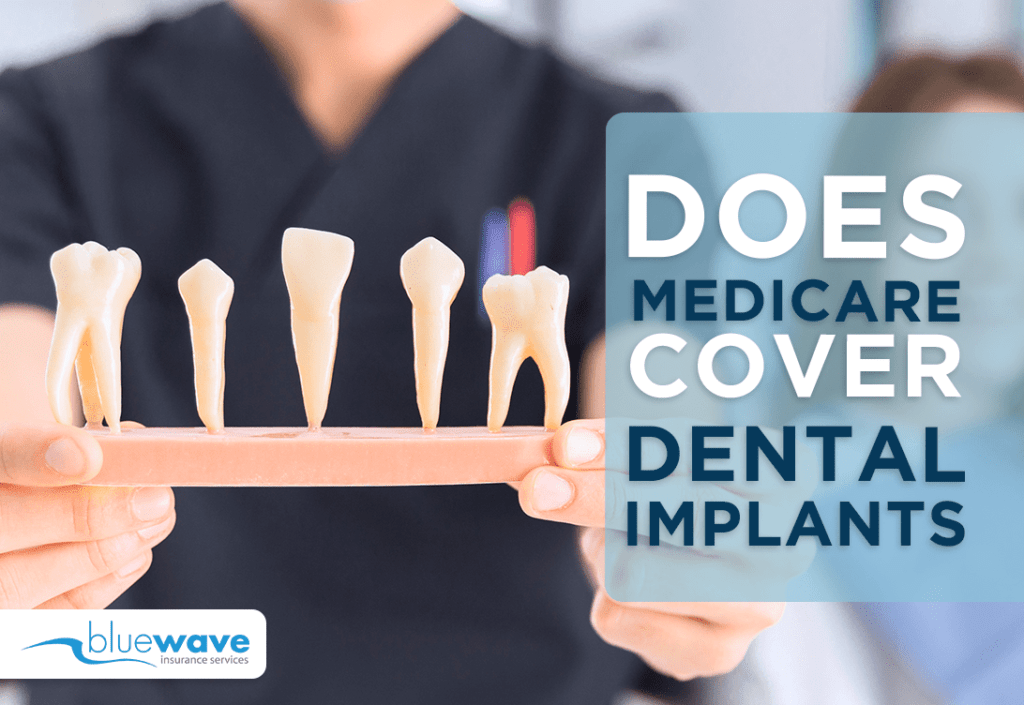
Even though we use them every day, it’s not always easy to take good care of our teeth. Dental care is not cheap, and high sugar content in our diets causes more tooth decay than many folks realize. Fortunately, dental implants are the next best thing to healthy, natural teeth. That said, the cost of dental implants is on the rise, leaving many people uneasy about going to the dentist. So, does Medicare cover dental implants?
For that matter, what are dental implants? What is the procedure like? And finally, how can you save on the cost of dental implants if and when you need them?
What are Dental Implants?
Dental implants work as a “root” for artificial teeth. If you need a crown, bridge, or another dental prosthesis, your dentist can use a dental implant to anchor the new tooth (or teeth). Dental implants are like screws that fuse with your jaw, providing the best possible tooth stability.
Does Medicare Cover Dental Implants?
In short, no, Original Medicare does not cover dental implants. In other words, neither Medicare Part A nor Medicare Part B covers dental implants. You will need to acquire a Medicare Advantage plan or private dental insurance to get coverage for dental implants.
Read more: Does Dental Cover Dental and Vision?
What Dental Care Does Medicare Pay For?
Medicare Part A will cover dental procedures you get while in a hospital. These procedures count as “inpatient care.” However, if you are not in a long-term care hospital or do not need dental implants as part of an emergency dental procedure, Medicare Part A will not cover them. So, if you want real dental coverage, you will need to get a new policy to supplement your Original Medicare.
However, if you experience complications resulting from dental implant surgery, Original Medicare will cover the cost of medical treatment. For example, if you get an infection after having a dental implant put in, Medicare would cover any inpatient or outpatient care that you may need.
Dental Implant Surgery
Like any surgery, there are risks involved with dental implants. The most common issues are infections. Less common problems include nerve damage, injury to the gum, and even sinus problems.
Nonetheless, dental implants are considered “low-risk” surgery. To better understand how dental implant surgery works, let’s look at when dentists use it, how you and your dentist will prepare for it, and what happens during the procedure:
When Do I Need Dental Implant Surgery?
Dentists, orthodontists, and oral surgeons use dental implant surgery to replace missing or damaged teeth. In some cases, dental implants are purely cosmetic. They are applied so that your dentist can put in one or more replacement teeth to improve your smile.
In other cases, dental implants may be necessary to improve your bite. If your bite is misaligned, it can cause jaw pain and even damage your tooth enamel. Adding or replacing damaged teeth can help orthodontists realign your bite so that your top and bottom teeth meet comfortably.
How Will My Dentist Determine If I Need Dental Implant Surgery?
You might need to see more than one specialist to determine if dental implants are right for you. In any case, your dentist (or another oral specialist) will evaluate your condition with a standard oral examination. This exam will likely involve a 3D scan or an X-ray of your mouth and jaw.
Even if dental implant surgery could improve your smile, your dentist will have to decide if dental implants are right for you. Certain underlying health conditions and habits increase the risk of infection or other adverse outcomes. Here are a few issues that your dentist will have to consider:
- Jawbone Health – Jawbones must be fully grown and strong enough to bond with dental implants.
- Oral Health – If you have gum disease or other oral health conditions, your dentist might delay or forego dental implants.
- Bone Healing – Issues like osteoporosis can slow or prevent bone healing, making dental implants risky.
- Tobacco – Smoking tobacco can increase the risk of infection after dental implant surgery.
Once a dentist has seen your oral health and medical history, they will determine if dental implants are right for you. If you meet the criteria, your dentist will discuss the details of the procedure and the treatment process with you. Then, they will develop a treatment plan that meets your specific needs.
Read More: How Much Does an MRI Cost With Medicare?
What Happens During Dental Implant Surgery?
Dental implant surgery is a multi-step process that can take months to complete. During the first step, your dentist will use a local or general anesthesia. Then, they will remove any damaged teeth and put the implants in place.
It will take a few weeks (or longer) for the implants to bond with your jawbone. Your doctor will evaluate how well they have bonded with 3D scans or X-rays. If your jaw is too soft or not thick enough to bond with implants, your dentist may need to conduct a bone graft before the surgery.
Your jawbone will need time to heal over the implant. This bond will provide the necessary strength to hold new teeth in place. Once your dentist has determined that the bone has healed as it should, they will place the abutment. Sometimes, your doctor may decide to put in the abutment at the same time as the implants.
If your abutments require a second surgery, you will likely be put under anesthesia again, as the surgeon will need to make one or more small incisions in your gums. Once both the implants and abutments are in place, your dentist can put in the artificial teeth or crowns. This procedure may or may not require sedation.
Post-Surgery Treatment and Medication
You will need to eat soft foods and avoid hot or cold liquids after each procedure. Your doctor may prescribe medication to deal with any post-surgical pain. If you have Medicare Part D or Medicare Advantage plans, these drugs may be covered. Unless you experience complications from the surgery (like an infection), the post-surgery treatment will be minimal.
Can a Medicare Supplement Plan Help?
Medicare Supplement Plans (also known as Medigap) help fill in the gaps in standard Medicare coverage (Parts A and B). There are a variety of Medigap plans out there, each with their own advantages for different folks. However, most supplement plans only cover emergency dental procedures.
If you get your health coverage through a Medicare Advantage plan, you may have coverage for certain dental services.. In some cases, you may need to look for private dental insurance to cover out-of-pocket services.
Agent Tip
Some Medicare Advantage plans include dental coverage. Contact us at 800-208-4974 to learn about Medicare plans that may include some dental coverage.
Conclusion
Does Medicare cover dental implants? The short answer is no; Original Medicare does not cover dental implants unless they are part of an emergency inpatient procedure. However, you can get coverage for dental implants through Medicare Advantage plans or private dental insurance.
If you have any further questions about Medicare or want to learn more about Medicare Advantage, call us at 800-208-4974 today!
